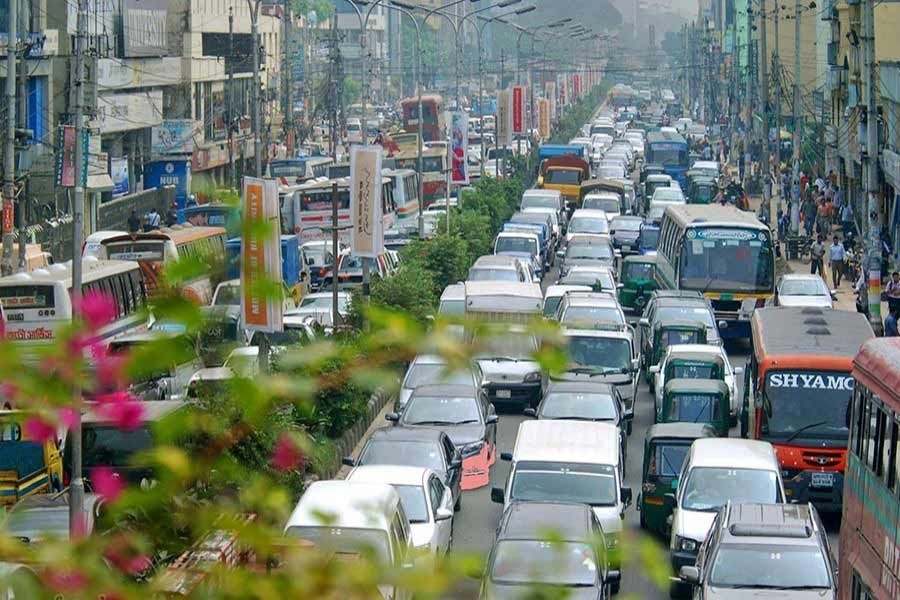There are few large cities in the present world where public defiance of urban laws rules the roost so blatantly. An outsider may find it difficult to believe that the city has just started returning to its hustle and bustle after a months-longshutdown. The closure was enforced by the government to minimise the transmission of the COVID-19 virus. Almost all the streets inthe city have lately begun experiencing the return of traffic gridlocks. The footpaths and the adjoining spaces are once again chockablock with pedestrians. The ubiquitous hawkers are back in theirhordes,toutingtheir merchandise, with stiflingly assembled crowds thronging the open-air shops. The scenes at upscale shopping malls are not much different.
From the views of tailbacks at important roundabouts to footpaths and alleyways filled with crowds, one might now draw the inevitable conclusion: Perhaps it's time Dhaka was declared corona-free. It's especially because the city-dwellers are no longer anxious to maintain the mandatory social or physical distance. Few bother about wearing masks, washing hands at public taps installed at roadsides or using hand sanitisers. The scenes of bus helpers standing at the vehicle gates with large bottles of disinfectants for passengers are rarely found.
In fact Dhaka seems to be trying to return to its normal or 'new normal'look. One would like to use the phrase 'new normal' due to the fact that people in the reopened city experience a number of developments not seen before. Alongside the people rushing along footpaths and commuting on buses without masks, there are a few who are found fully clad in PPE (personal protective equipment). Due perhaps to the summer heat, some others are seen in head covers with the KN 95 masksor face shields. They are, however, a rare sight. The reality is despite the sincere efforts taken by a section of conscious people, the capital remains overwhelmed by residents who are nonchalant, defiant and little worried about being infected or transmitting the pandemic virus to others.
The post-corona-shutdown scenario apart, the city of Dhaka is largely inhabited by people who are compulsively devoid of the basic civic awareness. This glaring drawback leads to countless hazards, and, at times, even deaths. Advocacy and sensitisation campaigns by activists hardly work. Seeing over a dozen people crossing a busy wide road at a wrong point,nurturing a heroic spirit of sorts, the traffic police find themselves in a quandary. Knowing full well the gesture to be futile, they still remind the jaywalkers of the foot over-bridges nearby. Few care to listen to them. Since the jaywalkers require some physical efforts to climb up the bridges' stairs and come down, these overpasses have long become anathema to them.
Given the same old anarchy prevailing on the roads of Dhaka, its residents find themselves mentally preparedto see the resumption oftraffic weeks and fortnights or road safety campaigns. The catch is the members of the public, automobile drivers, and even the traffic-law enforcers know well that these observances do not make a dent inthe road-based anarchy. Following the withdrawal of the COVID-19 shutdown, the public buses strictly followed coronavirus transmission-checking hygiene for some time. In the next few weeks, the measures of ensuring physical distance, passengers' sanitisationetc vanished. Baffled health-conscious passengers refrained from boarding the buses as they saw the passengers'frenzied melee at the gates. In course of time, these commuters started avoiding these vehicles.
The shutdown period witnessed the return of Dhaka's perennial curses of joblessness and begging, with a vengeance not seen before. A large number of low- and meagre-income people lost their sources of income --- many bordering on the verge of destitution. Alms seeking and desperate appeals for food and monetary help in the streets and neighbourhoods became a day-to-day scenario. On some evenings, people in droves were seen moving door to door. In a short time, the tone and style of the alms-seeking people became shrill and irreverent. People living in the residential areas didn't fail to detect traces of faint angerin the apparently helpless wails for help. However, it didn't last long.
The government and its affiliated agencies came forward with survival kits, especially those comprising food and cooking ingredients. Sporadic mismanagement, coupled with sloppy distribution systems etc whipped upmurmurs of discontent. Thanks to the entry of different charitable organisations,extremities inthe plight of people, stuck in destitution, began alleviating. These organisations have helped improve the condition of victims of the corona pandemic's fallout remarkably. In effect, the combined government and non-governmentendeavours to reduce widespread poverty came up on time.There were little scopes for the volatile economic situation to spiral out of control. The overall social ambience which prevailed during the shutdown period kept the extreme poor and the little earning,jobless segments equally discouraged from giving vent to whatever left of their discontentment. It's not for nothing that the wise old people have for ages been using the adage --- filled stomachs are a basic prerequisite for social peace.
Lots of people keen on observing the changing dynamics of Bangladesh society vis-à-vis the corona pandemic have apparently been disillusioned with the post-shutdown period. With the pandemic still moving unpredictably, people could not be made aware of the dread not in the least. These people also include the urban educated middle class. They canletthemselves get carried away by the so-called 'new normal', but they can ill afford to distance themselves from harsh realities.Dhaka may have somehow mustered the capability to stifle the brewing pandemic ordeals in the immediate past. But given thecity's recent increase in its propensity to get bogged down in anurbanmess, it may not get a chance for atonement.


